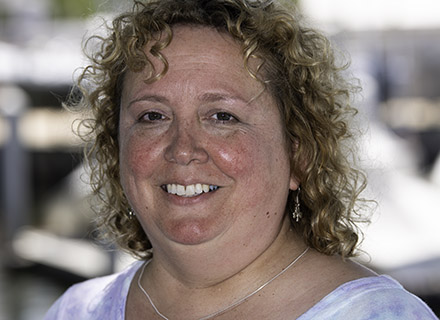Everyone deserves an education. That’s the principle DeVara Sims lives by.
For more than 20 years, Sims has taught students in public schools how to be better readers. Many of those students have learning disabilities. Some of them spend their days behind bars.
“I don’t see prisoners as prisoners,” said Sims, who holds a Master’s in Reading Education from USF St. Petersburg. “I see them as humans. And I truly believe that every human deserves an education.”
This past summer, Sims brought her passion for education and experience working in the juvenile justice system to a visionary program aimed at increasing literacy rates in local prisons. For six weeks, USF St. Petersburg’s College of Education partnered with the Florida Department of Corrections to offer literacy training to 48 inmates at the Polk Correctional Institute. Supported by Florida State Senator Jeff Brandes, USFSP faculty and alumni taught students reading, writing and vocabulary skills geared towards reducing recidivism by improving literacy and future job prospects.
The program was initiated by Drs. Susan Bennett and Annmarie Alberton Gunn, two faculty members whose work focuses on social justice and teaching multicultural classrooms. They launched the program after receiving a $375,000 grant from the Florida Department of Education’s State Appropriations.
A few days per week, Bennett, Sims and USF doctoral candidate Trace Taylor traded off teaching morning and afternoon classes. The students ranged from their early 20s to late 60s, and included four English-language learners.

Bennett and Sims worked with students on literacy and reading comprehension skills. The curriculum included First Lady Michelle Obama’s “Becoming,” comedian Trevor Noah’s “Born a Crime: Stories from a South African Childhood,” and novelist Alan Gatz’s “Refugee.” Students would listen to audiobooks while reading along with the text. After their independent readings, they responded to a list of prompts that challenged them to make connections between the texts, the real world and their own lives.
Bennett also helped students develop writing skills, including working on cover letters in preparation for future job applications, while Sims regularly brought in newspaper clippings and taught strategies for breaking down articles for better comprehension.
Taylor, meanwhile, taught grammatical aspects of writing, including the use of nouns, adjectives and commas. Students participated in peer editing and learned to elaborate and vary their vocabularies.
The program concluded in June. Both students and teachers were sorry to see it come to an end.
“We’re all sad it’s over,” said Bennett. “The students really enjoyed the program. Some of the guys in my afternoon class would stop by in the morning to say hi when I was teaching. And there are supposedly other inmates who were interested in joining the program. Hopefully we can figure out a way to keep this program going.”
For Sims, who teaches students at the Hillsborough Juvenile Detention Center, reading education is more than a job. It’s a vocation. “Literacy is my life,” she said, and insists “all prisons should have an academic component.”
Research suggests that Sims is right. Studies have found that prison education reduces recidivism rates by over 40 percent, which is good for individuals and society. Prison education has even been shown to have an economic benefit— a $1 investment in prison education reduces incarceration costs by up to $5 for the first three years after an inmate is released. It costs less to educate inmates than it does to reincarcerate them.
In a letter to his instructors, 34-year-old inmate Marcus Holliday shared his gratitude for the time they spent teaching him and his peers. “It’s been an experience I will cherish and appreciate for the rest of my life,” Holliday wrote. “In such [a] short time, I’ve learned more than my entire life of schooling.
“This class gave me so much hope and determination to better my literacy,” he continued. “I can see the vision clearly now. This program has bettered me in so many ways.”
